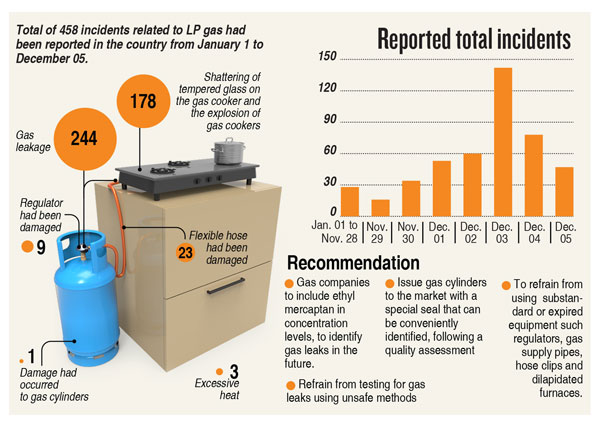News
Homes on danger watch after gas duopoly, govt band-aid
Uncertainty over the risks of cooking gas cylinders remain despite measures taken by companies on the instructions of the Consumer Affairs State Ministry this week.
More cooking gas-related explosions were reported on Friday, while confusion remained over instructions by state-owned Litro Gas, which claimed to be re-gathering gas cylinders of which the plastic seal above the valve had not been removed. Many gas vendors said they had not received such instructions.
Consumer Protection State Minister Lasantha Alagiyawanna confessed in Parliament last week that he cannot guarantee 100% safety for gas users as there was no regulation related to the cooking gas composition.

He told Parliament that he personally believed that the change in the gas composition was the cause of the 213 explosions reported so far this year, but that he was unable to prove it, as the country does not have laboratories to test the quality of imported gas.
The Ceylon Petroleum Corporation (CPC), which was initially assigned to test the composition of gas, had reported last week that 47% propane was detected.
However, the gas importer duopoly, refuted the claims declaring that the test was not scientific and not to required standards.
Litro Gas and Laugfs Gas said that the gas composition had been maintained at 70% butane and 30% propane.
Laugfs Gas, CEO, W.H.K Wegapitiya said the company had never changed the composition of the gas and always maintained propane at 30%.
“Our cylinders were found only in two explosions and they were proved to be negligence of the user,’’ he claimed.
State-owned Litro Gas, the company that claims 80% of the domestic gas market, declined to comment.
The least the government did was to introduce a new red seal on cylinders distributed from December 6. The seal, it was believed, would enable consumers to identify the new gas supply.
Additionally, the Consumer Affairs Authority (CAA) was directed to increase the ethyl mercapton content to 14% and carry out random checks on every 100 cylinders to ensure the existence of the pungent odor that alerts users to danger in the event of a leak.
Several safety measures to test gas leaks and ways to handle a burning cylinder have been introduced.
Also, the government will carry out checks at the port to determine the propane content of the gas at 20% to 30%.
The companies have been provided with equipment that checks pressure inside gas cylinders.
The importers have been directed to withdraw all previous gas stock from the market.
Sri Lankans who have unused gas cylinders with seals intact can return them to dealers in exchange for new stock.
But gas-related explosions have continued mostly in homes. Six incidents were reported on Thursday and five on Friday.
Gas users charged that the government has not taken proper measures to eliminate their fears and said that cosmetic measures will not stop the explosions.
“The root cause has to be addressed. We need complete safety,’’ one housewife said.
Meanwhile, the Public Utilities Commission of Sri Lanka (PUCSL) said the situation would not have arisen if a mandatory ratio on the gas composition had been introduced.
Chairman Janake Ratnayaka said that the PUCSL had prepared regulations on gas and other petroleum products in 2012, but successive governments had failed to introduce them.
“A regulatory body to monitor gas imports would have averted this problem,’’ he said.
The Sri Lanka Standards Institution (SLSI) is ready to test gas imports if regulations are introduced.
“Right now, only Sri Lanka Customs has the right to reject any gas consignments,’’ said the director and chemical engineer M. S. S. Fernando.
He said the composition of 70% butane and 30% propane had not been made mandatory.
Only regulations that have been made are related to maximum pressure of propane and butane, but that too, not in a mixed state.
Meanwhile, the inaction of the government has pushed the citizenry to seek redress at the Human Rights Commission (HRCSL) and in the courts.
HRCSL took up two complaints by the Young Journalist Association on Wednesday, December 8, demanding that consumers be protected by displaying markings indicating the date cylinders were refilled as well as the gas content and composition.
The CAA, the Sri Lanka Standards Institution (SLSI) and Litro Gas and Laugfs Gas were called for discussion but did not attend.
Laugfs CEO Mr. Wegapitiya said the company was not invited.
Also a writ to order the Inspector General of Police to investigate the incidents of explosions was filed in the Court of Appeal by civil society activists, alleging that imports of substandard gas was the cause of all explosions.
The best way to say that you found the home of your dreams is by finding it on Hitad.lk. We have listings for apartments for sale or rent in Sri Lanka, no matter what locale you're looking for! Whether you live in Colombo, Galle, Kandy, Matara, Jaffna and more - we've got them all!

